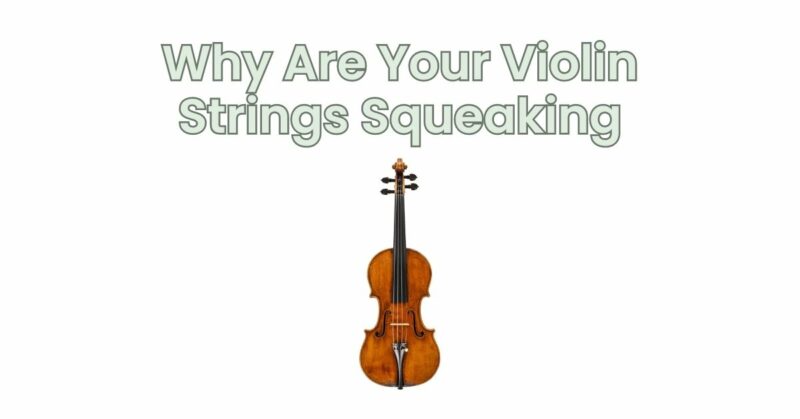As a violinist, you may encounter the frustrating issue of your violin strings squeaking while playing. These squeaky sounds can disrupt your performance and affect the overall quality of your playing. In this article, we will explore some common causes of squeaking violin strings and provide potential solutions to help you address and prevent this issue.
- Bow Technique:
- Insufficient Bow Pressure: One of the primary causes of squeaking strings is insufficient bow pressure. If you are not applying enough pressure on the strings, the bow may not grip the strings properly, resulting in squeaky and unstable sounds. Ensure that you maintain consistent and firm bow pressure throughout your bow strokes.
- Incorrect Bow Angle: The angle at which you hold the bow can also contribute to squeaking. If the bow angle is too flat or too steep, it can cause the bow hair to slip or grab the strings excessively, producing unwanted squeaks. Aim for a slight angle where the bow hair makes optimal contact with the strings without excessive pressure or slipping.
- Bow Speed and Control: Bowing too quickly or with jerky movements can lead to squeaking. Smooth and controlled bowing motions are crucial to producing clear and sustained tones. Practice slow and deliberate bowing exercises to improve control and minimize squeaking.
- Rosin Application:
- Insufficient Rosin: Lack of sufficient rosin on the bow hair can cause squeaking. Rosin provides grip and friction between the bow hair and the strings, allowing for smooth and controlled bowing. Ensure that your bow hair is adequately rosined before playing to prevent squeaking.
- Excessive Rosin: Conversely, excessive rosin on the bow hair can also lead to squeaking. When there is an excessive buildup of rosin, it can create a sticky surface that hinders smooth bowing and causes squeaking. Regularly clean your bow hair with a soft cloth to remove excess rosin buildup.
- String Maintenance:
- Dirty or Worn-out Strings: Dirt, rosin buildup, and worn-out strings can contribute to squeaking. Clean your strings regularly with a soft cloth or string cleaner to remove any debris or rosin residue. Additionally, consider replacing old or worn-out strings to ensure optimal sound quality and minimize squeaking.
- Instrument Setup:
- Nut and Bridge Issues: A poorly fitted or worn nut or bridge can cause the strings to vibrate unevenly, leading to squeaking sounds. Inspect the nut and bridge for any signs of wear or improper fit. Consult a luthier or violin technician for adjustments or replacements if necessary.
- Fine Tuner Problems: Loose or improperly adjusted fine tuners can also contribute to string squeaking. Check that the fine tuners are securely tightened but not overly tightened. If necessary, make small adjustments to find the optimal balance that allows for smooth tuning without excessive pressure on the strings.
Conclusion:
Squeaking violin strings can be a frustrating issue for violinists, but understanding the causes and implementing the appropriate solutions can help you overcome this problem. By addressing bowing technique, ensuring proper rosin application, maintaining clean strings, and examining instrument setup, you can minimize squeaking and achieve a smoother and more enjoyable playing experience. Remember to practice with attention to bow pressure, angle, and control, apply sufficient but not excessive rosin, regularly clean your strings, and maintain proper instrument setup. If you continue to experience persistent squeaking, consult with a violin teacher or a qualified luthier who can provide personalized guidance and assistance. With practice and attention to detail, you can overcome squeaking violin strings and produce beautiful and seamless music on your instrument.


